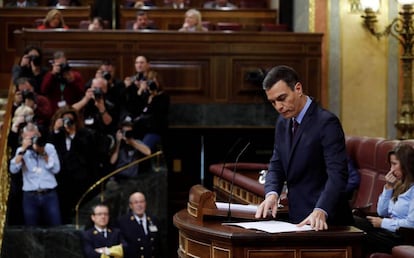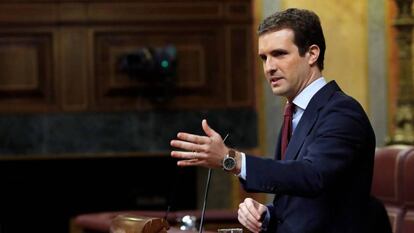Spanish PM: Catalan politicians creating narrative of “lies and grievances”
Socialist Party chief Pedro Sánchez hardened his tone against the supporters of independence in Congress today, comparing the situation in the region with Brexit

Spanish Prime Minister Pedro Sánchez on Wednesday hardened his position on the situation in Catalonia during the first single-issue debate to be held in Congress since he came to power in June. The Socialist Party (PSOE) chief warned the assembled deputies that he would not tolerate breaches of the Constitution, and accused parties that are in favor of an independent Catalonia of creating a narrative of “lies and grievances.”
I will not accept a new violation of the Constitution in Catalonia
Spanish PM Pedro Sánchez
Sánchez’s statements came after another series of disturbances in the northeastern Spanish region, which has been immersed in a situation of political and social turbulence since last year, when an illegal referendum on independence was held and a unilateral declaration of independence was passed through the regional parliament.
Grassroots pro-independence groups calling themselves the Committees to Defend the Republic (CDR) blocked a highway and tampered with toll plazas in Catalonia this weekend, without any interference from the regional police force, the Mossos d’Esquadra. The protesters staged the action to call for the release of Catalan independence leaders who are currently being held in pre-trial detention for their involvement in the separatist push. Several of the politicians and civic leaders are currently staging a hunger strike in protest at the failure of the Spanish courts to pass their appeals on to the European justice system.
“I will not accept a new violation of the Constitution in Catalonia,” said Sánchez, in reference to the events of last year, which saw the then-Popular Party (PP) government of Mariano Rajoy suspend regional powers under Article 155 of Spain’s Magna Carta.
Sánchez said he would not hesitate to act if there was another “omission of responsibilities” from Catalan political leaders
Speaking in Congress, Sánchez made clear that he would not authorize a referendum on independence for the region, which only leaves room, he added, for the “development and refinement” of self-governance in Catalonia – i.e. reforms to the “Estatuto,” the statute that lays out the region’s powers.
Sánchez is currently in a delicate position in power, having become prime minister thanks to winning a vote of no confidence he tabled against Rajoy, whose party had become mired in corruption cases and was also heavily criticized for having let the situation in Catalonia spiral out of control. He is currently leading a minority government with just 84 seats in Congress (an absolute majority is 176 in the 350-seat house), and needs the support of a wide range of parties – including Catalan nationalists – to pass legislation.

During his statements, Sánchez said that he would not hesitate to act if there was another “omission of responsibilities” on the part of Catalan political leaders, as, he argued, took place at the weekend when instructions were not conveyed to the regional Mossos d’Esquadra police force to intervene in the protests.
Sánchez warned that he would send national police officers to Catalonia if it were necessary, in order to guarantee safety and maintain public order in the region. His words came two days after he sent three letters to Catalan regional chiefs warning that if they did not comply with their obligations, the state would intervene to do so instead.
Gibraltar
The prime minister also mentioned the United Kingdom’s ongoing process of withdrawal from the European Union, commonly known as “Brexit,” saying that both it and the situation in Catalonia “go against the common European project.” He also warned that “nothing creates more division than a referendum,” adding that the only path for the secessionists is “dialogue for more self-governance, but within the framework of the Constitution.”
He argued that Brexit had divided the United Kingdom and had seriously damaged the future of the younger generation of Britons who don’t want to leave the European Union, adding that “the Catalan independence movement was undermining the European common project.”
Post-Brexit rights
Sánchez stated on Wednesday that “safeguarding the rights of EU citizens in the United Kingdom and vice-versa is an absolute priority for this government. European and British citizens will see their rights protected with this Withdrawal Agreement.”
He added that the suggestion by current Catalan regional premier Quim Torra that the “Slovenian path” was the “road to freedom” for the region was “unacceptable,” given that the breakaway of the country from Yugoslavia ended with a conflict in which nearly a hundred people lost their lives.
In response to the prime minister’s statements in Congress, the leader of the conservative PP, Pablo Casado, insisted that the PSOE government must intervene in Catalonia once more and call general elections. “Let’s go to the Senate to vote on the application of Article 155,” he said. “There is nothing left to offer here, your adventure is over.”
The leader of the center-right party Ciudadanos, Albert Rivera, was more respectful but had the same message for Sánchez: “Put a date on elections now,” he said. “Call the people to the ballot boxes, so that a strong government emerges.”
Until now, Sánchez has resisted calls for a fresh general election, but has admitted in the past that he will have to go back to the polls if he is unable to muster support for his 2019 budget plan.
English version by Simon Hunter.
Tu suscripción se está usando en otro dispositivo
¿Quieres añadir otro usuario a tu suscripción?
Si continúas leyendo en este dispositivo, no se podrá leer en el otro.
FlechaTu suscripción se está usando en otro dispositivo y solo puedes acceder a EL PAÍS desde un dispositivo a la vez.
Si quieres compartir tu cuenta, cambia tu suscripción a la modalidad Premium, así podrás añadir otro usuario. Cada uno accederá con su propia cuenta de email, lo que os permitirá personalizar vuestra experiencia en EL PAÍS.
¿Tienes una suscripción de empresa? Accede aquí para contratar más cuentas.
En el caso de no saber quién está usando tu cuenta, te recomendamos cambiar tu contraseña aquí.
Si decides continuar compartiendo tu cuenta, este mensaje se mostrará en tu dispositivo y en el de la otra persona que está usando tu cuenta de forma indefinida, afectando a tu experiencia de lectura. Puedes consultar aquí los términos y condiciones de la suscripción digital.








































